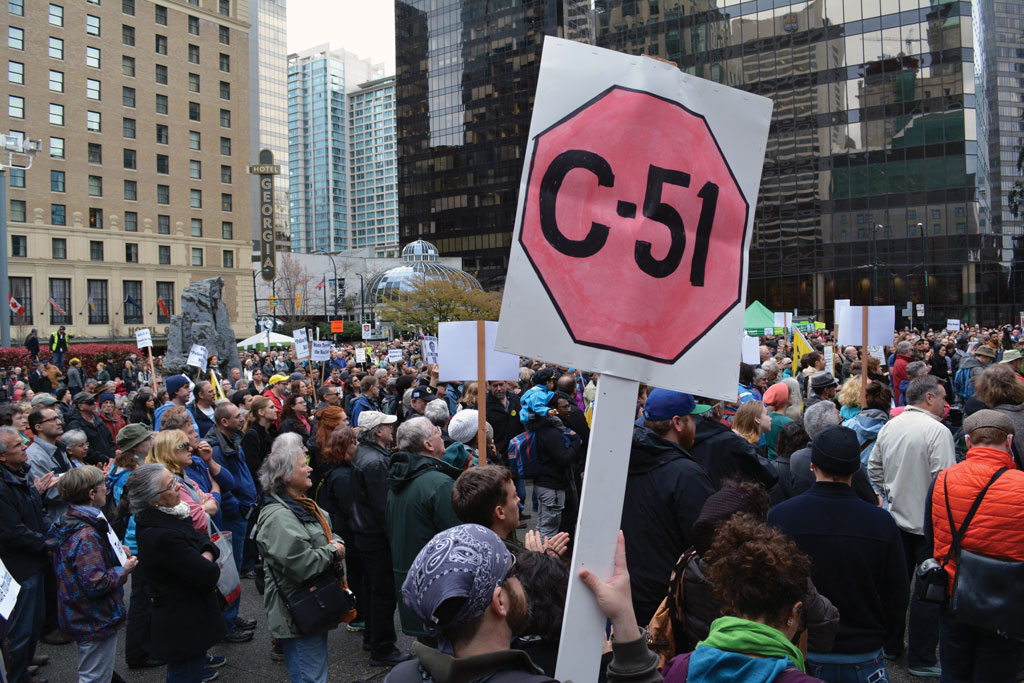By Kodie Cherrille (The Cascade) – Email
Print Edition: March 25, 2015
Bill C-51, the proposed Anti-terrorism Act, has been criticized by its opponents as unconstitutional since it was first introduced and read at the House of Commons on January 30.
The Conservative Party of Canada calls the bill an extension of existing legislation like the Combatting Terrorism Act and the Nuclear Terrorism Act, and is a step towards better countering terrorist threats.
However, the bill is criticized for its use of the phrase “terrorism in general,” which opponents argue is too vague, therefore allowing for a possibly unfair interpretation of what is deemed terrorist activity.
In the Canadian Centre for Policy Alternatives’ magazine the Monitor, Clayton Ruby and Nader R. Hazan argue that the bill threatens Canadians’ rights to freedom of speech.
“The new standard for arrest and detention — reason to suspect that they may commit an act — is so low that an officer may be inclined to arrest and detain them in order to investigate further,” they state.
Opponents also argue that Bill C-51 extends the powers of the Canadian Surveillance Intelligence Service (CSIS) at the expense of Canadian rights, and with a lack of accountability.
In a letter to the Globe and Mail, Privacy Commissioner of Canada Daniel Therrien claims that the bill is a fundamental breach of privacy and that the safeguards placed on it are not strict enough to keep it from being unconstitutional.
“Bill C-51 opens the door to collecting, analyzing, and potentially keeping forever the personal information of all Canadians,” Therrien writes. “The privacy safeguards proposed are seriously deficient.”
Others speaking out against the bill include leader of the opposition Thomas Mulcair, Amnesty International Canada, the Canadian Civil Liberties Association, and former prime ministers Paul Martin and Jean Chrétien. According to polls from the Angus Reid Institute and Forum Research, initial support for the bill is declining, and Canadians from across the country protested the bill on March 13 in a “Day of Action.”
Despite this mounting criticism, the Conservatives maintain that the bill is necessary for the security of Canadians.
Abbotsford MP and interim Foreign Affairs Minister Ed Fast strongly supports for the bill. He says that the current model of oversight by Security Intelligence Review Committee (SIRC) acts as an unbiased source to keep CSIS accountable.
“There are rigorous, judicial reviews and traditional judicial authorization mechanisms that are put in place to ensure that key investigative powers are actually exercised,” Fast says.
Other politicians such as Justin Trudeau support the bill but have proposed changes to the oversight model. Fast says that MPs opposing the bill have suggested forming a political oversight committee, to include input from other parties. He says that this would disrupt the impartiality of SIRC.
In an opinion article, CBC senior correspondent Terry Milewski expresses concern for the current state of SIRC.
“Canada’s allies all make their spy agencies accountable to powerful parliamentary or congressional committees,” he says, “not to small, understaffed appointed bodies whose expertise has often been in doubt.”
When asked whether this bill infringes on privacy, Fast said that the current threat by jihadists is increasingly becoming a threat to Canadians, with recent attacks like the Parliament Hill shooting in Ottawa and the shooting of two members of the Armed Forces in Quebec. Fast says the bill is meant to focus on terrorists, not law-abiding Canadians.
“[Bill C-51] reflects the appropriate balance: one that protects privacy rights, but at the same time provides our security agencies with the critical tools they need to actually protect Canadians and intercept terrorist threats,” he says.
UFV philosophy professor Paul Herman compared the current political attitude towards anti-terrorism to the tense atmosphere of teaching when the War Measures Act was read in October 1970.
“A student wanted to talk about [Marx, Lenin, and the FLQ]. It was illegal to express any kind of support of the FLQ. What does that mean? Does it mean expressing support for their aims or what they’re doing? Or saying, ‘While I don’t condone it, I understand it?’”
As for what this means for students, both Fast and Herman are skeptical that the bill would affect student life and current teaching material. Fast says that activities like protests, advocacy or dissent, or artistic expression would not be affected.
But Herman put it differently. “I don’t think someone, even like Harper, would [go] to a university and say, ‘They’re teaching to make students sympathetic to the cause of the terrorists.’ I don’t know. I don’t think they’d be clever enough.”



